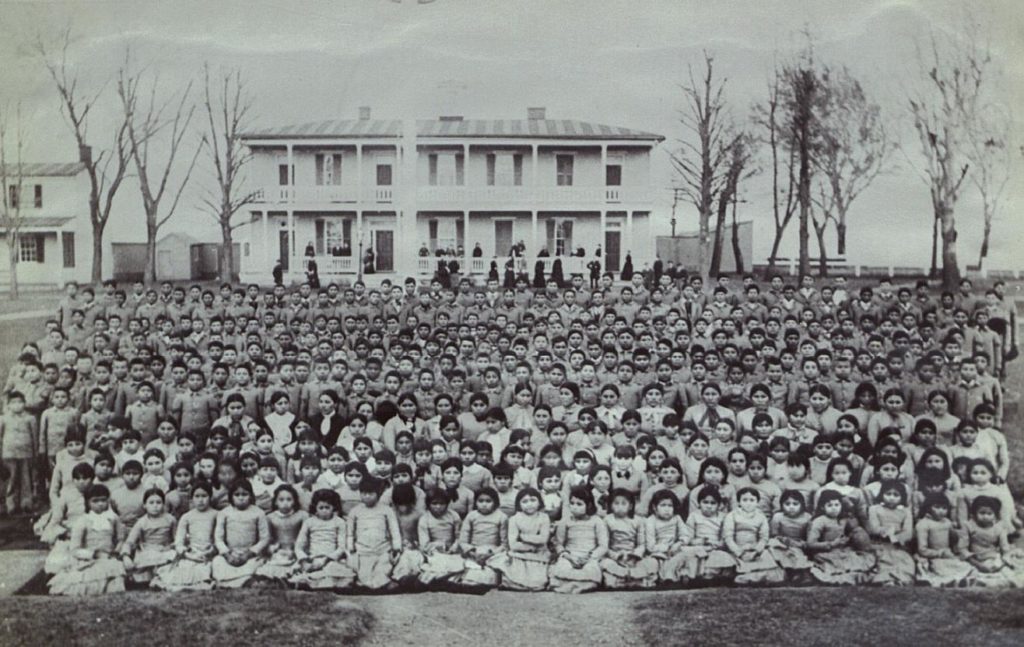Remembering the 215

tw: physical, sexual abuse, suicide, substance abuse, child death
NAYA offers its heartbroken prayers and condolences to all who have been impacted by news of the discovery of the mass gravesite of 215 children at a Canadian residential school. These prayers are for the families directly impacted, but also our Indigenous relatives around the world for whom such news re-opens painful wounds and lingering trauma.
We are now several days into processing the news, and from the stream of headlines, impromptu ceremonies throughout Indian Country, and individual testimonials on social media, it’s clear that the legacy of the residential schools continues to be an unhealed wound in our families and communities.
For our non-Indigenous allies, we urge you to educate yourself about the history of residential schools. Generations upon generations of Indigenous children were forcibly removed from their families, ripped from their culture and homes with the goal of hastening their assimilation into White society. This tool of forced assimilation was used by colonizers who proudly saw eradicating Native language, culture, and tribal cohesion through unspeakable violence and abuse as necessary to achieve the goal to “Kill the Indian and save the man.”
Alone and terrified, multiple generations of Indigenous children had their hair cut, were used as cheap labor, were forbidden to speak their languages or practice their cultural ways, and were viciously beaten and sexually abused. And, as the rest of the world is now learning, countless Native children never made it home.
Look to any Native family tree and you’ll find the impact of residential schools. Ask any Indigenous person in the U.S., Canada, New Zealand, and Australia about them and they will mention a grandma, uncle, or great-grandpa who attended. For many, the taking of our grandparents to the grim and violent environment of residential schools marks the onset of our familial intergenerational trauma. In many families, it’s the point when our traditional ways of being—of positive Indian parenting and communal nurturing—abruptly ceased forever. For residential school survivors, the pain and cultural disconnection continued long after leaving school.
It’s only with this context can our non-Native allies truly understand the horror and grief and pain our people are currently experiencing. We grieve for the 215 children who were lost in Kamloops, British Columbia. And we grieve for the countless others who remain buried in unmarked graves in the shadows of residential schools everywhere. We grieve for the generations of survivors who, upon leaving the residential schools, felt lost between two cultures. We grieve for those lost to abuse, suicide, and the slow death of substance abuse for those who had no other resources to help them process through their trauma.
As difficult as it can feel through this painful reminder, we must remain steadfast in the ways we can address the harms caused by the residential schools, and prevent future harms from happening to our children.
- We must insist on more investment in mental health and substance abuse resources in Indian Country to address the unresolved intergenerational trauma that continues to harm our communities.
- We must support the efforts to strengthen child welfare laws to withstand continuous attacks by those committed to overturning the Indian Child Welfare Act—to return us to the days when one-in-three children were removed from their homes and most adopted into non-Native households.
- We must support those policymakers in the U.S. House of Representatives who have introduced theTruth and Healing Commission on Indian Boarding School Policy Act, a bill that, if passed into law, would study the legacy of the residential schools.
- And we must demand that all residential schools globally be subjected to inspections of their historic grounds to locate the scores of lost Indigenous children that we know are still there. They must be brought home.
Please take good care of one another. There are many resources available to help you if you are struggling. We encourage everyone who needs the support of the community to join tonight’s Future Generations Collaborative Community Conversation beginning at 7 pm. Details are below.
Healing in the Time of Hurt
Thursday, June 3, 2021
7–8 pm
Zoom meeting ID 83069197866
Passcode 925620